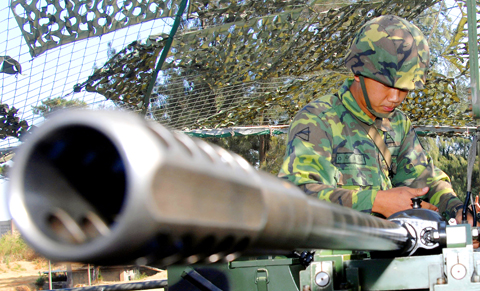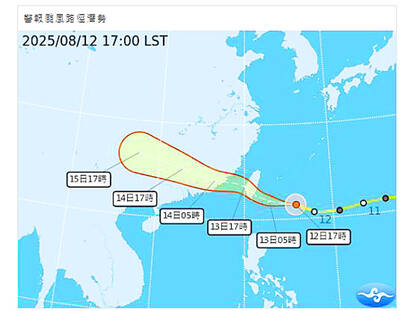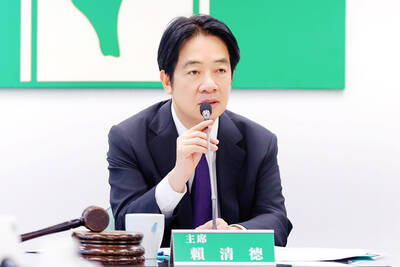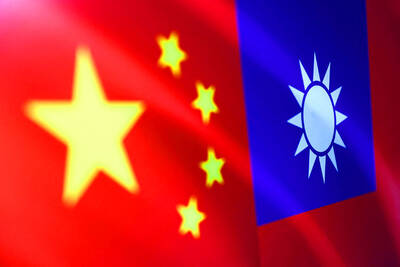President Ma Ying-jeou (馬英九) visited Kinmen yesterday to mark the 60th anniversary of the battle of Kuningtou (古寧頭) in which Nationalist troops stopped the People’s Liberation Army from taking the island and threatening Taiwan proper.
Thanking the armed forces for winning the crucial battle after the Nationalists had lost China to the Communists, Ma said the fight was a pivotal moment in the history of China that changed the fate of both sides of the Strait.
Ma said that for the past 60 years the two sides have been governed by two different entities with entirely different ideologies and political and economic systems.

PHOTO: PATRICK LIN, AFP
“The battle of Kuningtou was the first engagement in efforts by the Republic of China [ROC] government to protect Taiwan after it recovered the island in 1945,” he said. “The battle provided the basis for subsequent efforts to building Taiwan.”
The Battle of Kuningtou began on Oct. 25, 1949, when Communist Chinese warships carrying more than 10,000 troops landed at Kuningtou on the northwestern tip of Kinmen.
During the three-day battle, about 1,200 ROC soldiers died, while 3,000 of their Communist counterparts were killed and 7,000 captured.
Ma made the remarks while addressing military personnel inside Qingtian Tunnel (擎天坑道) at Kuningtou yesterday morning.
Ma said the two sides had engaged in “epoch-making experiments” since then.
Taiwan made strenuous efforts to survive under authoritarian and democratic rule and develop amid economic competition between the US, Japan and China.
“We successfully blended broad and profound Chinese tradition with the open and enterprising ocean culture and transformed it into a Chinese culture with distinguishing Taiwanese features,” he said.
China experienced dramatic changes over the years and now has risen economically and politically in East Asia, a road that was more difficult and tortuous than Taiwan’s, Ma said.
Looking back at the Battle of Kuningtou, Ma said the public not only owed thanks to those who lost their lives, but also a promise to turn a “killing zone” into a “peace square.”
“Our determination to build an army and prepare for war is resolute, and so is our will to protect Taiwan, Penghu, Kinmen and Matsu,” he said. “At the dawn of cross-strait reconciliation, we will resolve animosity, make peace sustainable and consign killing to history through cross-strait negotiations.”
Ma later attended the ribbon-cutting ceremony at Peace Memorial Square, where he urged both sides to “exercise the wisdom of the Chinese nation” to resolve cross-strait disputes with a peaceful approach that both sides find acceptable.
The president also said he would be happy to see the construction of a Kinmen Bridge, which would connect Kinmen island and Small Kinmen — or Lieyu (烈嶼), an islet township just west of Kinmen proper.
He then paid his respects at Mount Taiwu Cemetery (太武山公墓). At one point, he and the honor guard were dumbstruck when a wreath he had just laid at the tomb was blown off by a strong gust of wind. A member of the military quickly picked it up and put it back in place.
During the Battle of Kuningtou, Mount Taiwu was the target of China’s heaviest attacks because it housed the Kinmen Defense Command.

GET TO SAFETY: Authorities were scrambling to evacuate nearly 700 people in Hualien County to prepare for overflow from a natural dam formed by a previous typhoon Typhoon Podul yesterday intensified and accelerated as it neared Taiwan, with the impact expected to be felt overnight, the Central Weather Administration (CWA) said, while the Directorate-General of Personnel Administration announced that schools and government offices in most areas of southern and eastern Taiwan would be closed today. The affected regions are Tainan, Kaohsiung and Chiayi City, and Yunlin, Chiayi, Pingtung, Hualien and Taitung counties, as well as the outlying Penghu County. As of 10pm last night, the storm was about 370km east-southeast of Taitung County, moving west-northwest at 27kph, CWA data showed. With a radius of 120km, Podul is carrying maximum sustained

President William Lai (賴清德) yesterday criticized the nuclear energy referendum scheduled for Saturday next week, saying that holding the plebiscite before the government can conduct safety evaluations is a denial of the public’s right to make informed decisions. Lai, who is also the chairman of the Democratic Progressive Party (DPP), made the comments at the party’s Central Standing Committee meeting at its headquarters in Taipei. ‘NO’ “I will go to the ballot box on Saturday next week to cast a ‘no’ vote, as we all should do,” he said as he called on the public to reject the proposition to reactivate the decommissioned

US President Donald Trump on Friday said that Chinese President Xi Jinping (習近平) told him China would not invade Taiwan while Trump is in office. Trump made the remarks in an interview with Fox News, ahead of talks with Russian President Vladimir Putin over Moscow’s invasion of Ukraine. “I will tell you, you know, you have a very similar thing with President Xi of China and Taiwan, but I don’t believe there’s any way it’s going to happen as long as I’m here. We’ll see,” Trump said during an interview on Fox News’ Special Report. “He told me: ‘I will never do

EXCEPTIONS: Some people could be allowed to reclaim citizenship for humanitarian reasons or because of their contributions to the nation, the interior ministry said Taiwan would soon unveil new rules banning Taiwanese residents of China from reclaiming their citizenship if they participated in Beijing’s propaganda activities, the Ministry of the Interior said on Monday. The measures were drafted following President William Lai’s (賴清德) March 13 directive that the government counter China’s espionage and influence campaigns aimed at undermining Taiwan’s sovereignty, the ministry said in a preview of the rules. The changes would affect Taiwanese who lost their citizenship after becoming permanent residents of China or obtaining passports issued by China, it said. Under the measures, former Taiwanese nationals living in China who had made statements denying the